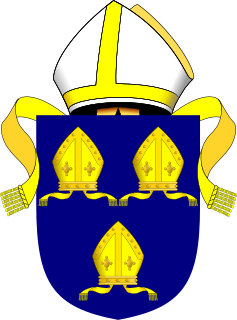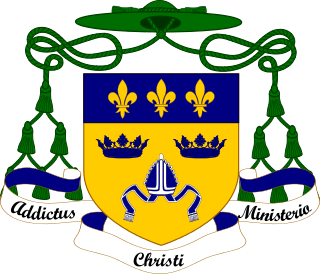Related Research Articles

East Anglia is a geographical area in the East of England. The area included has varied but the legally defined NUTS statistical unit comprises the counties of Norfolk, Suffolk and Cambridgeshire. The name derives from the Anglo-Saxon kingdom of the East Angles, a tribe whose name originated in Anglia, in what is now northern Germany.

Edmund the Martyr was king of East Anglia from about 855 until his death.

Bury St Edmunds, commonly referred to locally as Bury, is a historic market, cathedral town and civil parish in Suffolk, England. Bury St Edmunds Abbey is near the town centre. Bury is the seat of the Diocese of St Edmundsbury and Ipswich of the Church of England, with the episcopal see at St Edmundsbury Cathedral.

The Bishop of Norwich is the ordinary of the Church of England Diocese of Norwich in the Province of Canterbury. The diocese covers most of the county of Norfolk and part of Suffolk. The bishop of Norwich is Graham Usher.
This article describes the history of Suffolk, the English county.

Troston is a village and civil parish in the English county of Suffolk.

Æthelberht, also called Saint Ethelbert the King, was an eighth-century saint and a king of East Anglia, the Anglo-Saxon kingdom which today includes the English counties of Norfolk and Suffolk. Little is known of his reign, which may have begun in 779, according to later sources, and very few of the coins he issued have been discovered. It is known from the Anglo-Saxon Chronicle that he was killed on the orders of Offa of Mercia in 794.

Sir Henry Bedingfeld (1505–1583), also spelled Bedingfield, of Oxburgh Hall, King's Lynn, Norfolk, was a Privy Councillor to King Edward VI and Queen Mary I, Lieutenant of the Tower of London, and Vice-Chamberlain of the Household and Captain of the guards. With Sir Henry Jerningham he was among the principals who rallied to Mary's cause following the death of Edward VI in 1553 and helped to set her upon the throne. He was a senior figure in the kinship group of Catholic recusant landowning knights of Suffolk. Given responsibility for the custody of Mary I's half-sister Elizabeth when in the Tower of London and at Woodstock, his reputation has suffered from the repetition of claims of his severity towards her: however Queen Elizabeth was respectful towards him and continued to find service for him. Among the foremost Englishmen of his time, he occupied prominent and honourable positions and was of unquestioned loyalty.
The East of England Regiment (EER) was the infantry unit of the Territorial Army of the East Midlands and East Anglia from 1 July 1999 to 1 April 2006. Upon the re-organisation of the infantry in 2006, the regiment became 3rd Battalion, Royal Anglian Regiment.

Felix of Burgundy, also known as Felix of Dunwich, was a saint and the first bishop of the East Angles. He is widely credited as the man who introduced Christianity to the kingdom of East Anglia. Almost all that is known about the saint originates from The Ecclesiastical History of the English People, completed by Bede in about 731, and the Anglo-Saxon Chronicle. Bede praised Felix for delivering "all the province of East Anglia from long-standing unrighteousness and unhappiness".

The Roman Catholic Diocese of East Anglia is a diocese of the Latin Church of the Roman Catholic Church covering the counties of Cambridgeshire, Norfolk, Suffolk, and Peterborough in eastern England. The diocese makes up part of the Catholic Association Pilgrimage.
Nina Frances Layard was an English poet, prehistorian, archaeologist and antiquarian who conducted important excavations, and by winning the respect of contemporary academics helped to establish a role for women in her field of expertise.

The Kingdom of the East Angles, today known as the Kingdom of East Anglia, was a small independent kingdom of the Angles comprising what are now the English counties of Norfolk and Suffolk and perhaps the eastern part of the Fens. The kingdom formed in the 6th century in the wake of the Anglo-Saxon settlement of Britain. It was ruled by the Wuffingas dynasty in the 7th and 8th centuries, but fell to Mercia in 794, and was conquered by the Danes in 869, to form part of the Danelaw. It was conquered by Edward the Elder and incorporated into the Kingdom of England in 918.

Norwich Church of England Young Men's Society Football Club, commonly called Norwich CEYMS is a football club based in Swardeston, near Norwich, in Norfolk, England. They are currently members of the Anglian Combination Premier Division, having previously played in the Eastern Counties League. It has been suggested that the world's oldest football song, "On The Ball, City", was used for CEYMS before being adopted by Norwich City.

Ixworth is a village and civil parish in the West Suffolk district of the English county of Suffolk. It is 6 miles (9.7 km) north-east of Bury St Edmunds on the A143 road to Diss and 9 miles (14 km) south-east of Thetford. The parish has a population of 2,177, increasing to 2,365 at the 2011 Census. The south end of High Street and town may also be historically listed as Ixworth St Mary.

William Downham, otherwise known as William Downman, was Bishop of Chester early in the reign of Elizabeth I, having previously served as her domestic chaplain.
The East Anglian League was a football league in the East Anglia region of England.

St Edmund's church is a Roman Catholic parish church in Bury St Edmunds, Suffolk. It was founded by the Jesuits in 1763 and the current church was built on that site in 1837. It is situated on Westgate street in the centre of the town. It is administered by the Diocese of East Anglia, in its Bury St Edmunds deanery. It is a Grade II* listed building.

The 6th (Volunteer) Battalion, Royal Anglian Regiment was a part-time infantry unit of the British Army part of the Territorial Army (TA). Originally formed in 1971 from the expansion of many cadres, the battalion would eventually be disbanded in 1999 and formed sub-units in the new East of England Regiment. Today, the battalion's successors still form part of the Army Reserve (AR) component of the Royal Anglian Regiment's only remaining reserve unit, the 3rd (V) Bn.
References
- 1 2 "Medal honour for historian of East Anglian Catholicism". Diocese of East Anglia. 27 September 2020.
- ↑ "Fellows Remembered: Joy Rowe". SALON: Online Newsletter of the Society of Antiquaries of London. Society of Antiquaries of London. 30 September 2020.
- ↑ "Mrs Joy Rowe". Society of Antiquaries of London. Retrieved 30 September 2020.